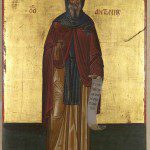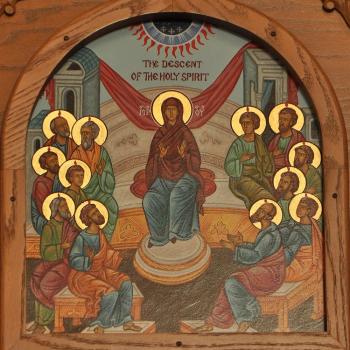![Icon of Pentecost By Anonymous [Public domain], via Wikimedia Commons Russland, 18. Jh.](https://wp-media.patheos.com/blogs/sites/637/2016/05/Icon_of_Pentecost_18th_c._Russia._Priv.coll_.-254x300.jpg)
And therefore He came after Christ, that a Comforter should not be lacking unto us; but Another Comforter, that you might acknowledge His co-equality. For this word Another marks an Alter Ego, a name of equal Lordship, not of inequality. For Another is not said, I know, of different kinds, but of things consubstantial. And He came in the form of Tongues because of His close relation to the Word. And they were of Fire, perhaps because of His purifying Power (for our Scripture knows of a purifying fire, as any one who wishes can find out), or else because of His Substance. For our God is a consuming Fire, and a Fire burning up the ungodly; though you may again pick a quarrel over these words, being brought into difficulty by the Consubstantiality. And the tongues were cloven, because of the diversity of Gifts; and they sat to signify His Royalty and Rest among the Saints, and because the Cherubim are the Throne of God. And it took place in an Upper Chamber (I hope I am not seeming to any one over tedious), because those who should receive it were to ascend and be raised above the earth; for also certain upper chambers are covered with Divine Waters, by which the praise of God are sung. [1]
The Holy Spirit, though sent by the Son, is equal to the Son. Both are God and reveal their divinity in their own personal way. Jesus is the healer of our souls; he comes to us with the comfort of a doctor who mends the harm done to us due to the disease of sin. As we do not totally understand the way sin infects us and needs to be rooted out, so we often do not understand the ways Christ is at work with us, which is why we often languish in confusion as the healing takes place. Yet, we are comforted knowing Christ is there, working for us, taking care of us, as the Divine Physician whose prescription we know will heal us if we follow it through its dictates to the end.
The Holy Spirit comes as another Comforter. Christ heals us, and brings us into union with himself, giving us access to the Holy Spirit, the Spirit of Truth, the Spirit which brings us not only life, but with such life, its treasury of blessings, that which makes life worthwhile and blessed. Through our union with Christ, we can open up to the Holy Spirit; through the Holy Spirit, we find ourselves raised up so that we have access to the divine life. Through our union with Christ and the indwelling of the Holy Spirit which comes as a result, we become partakers of the divine nature. Through Christ, we are healed and have the comfort of the divine doctor who is our friend; in union with Christ, we have the comfort of the Holy Spirit, the one who gives us transcendent glory, allowing us to truly become the person God intended us to be in Christ Jesus.
On Pentecost, we remember, then, when Jesus sent us the Holy Spirit with the comfort which the Spirit is to give to us; we have a spiritual thirst, which can only be satisfied by the Holy Spirit, the ever-flowing river of life:
On the last day of the feast, the great day, Jesus stood up and proclaimed, “If any one thirst, let him come to me and drink. He who believes in me, as the scripture has said, `Out of his heart shall flow rivers of living water.'”
Now this he said about the Spirit, which those who believed in him were to receive; for as yet the Spirit had not been given, because Jesus was not yet glorified. (Jn 7:37-9 RSV).
The ascension can be seen as the end of Jesus’ priestly mediation; through it, he lifts the earth out of its fallen state and opens it up to be penetrated by the power of the kingdom of heaven. Only once this last act of Christ is achieved can he send the Holy Spirit, for only once the earth and those in it have been made ready for the Holy Spirit, can the Holy Spirit find room within the hearts of humanity and fill them with its gifts. The other hand of the Father, the other revealing arm of God, is sent to the church to comfort it and guide it so that those who find themselves in it can then become anointed by it and be called christs in Christ Jesus. The Holy Spirit is sent to transform us so that we shall become by grace which Jesus is by nature, and so posses Christ in ourselves, as St. Cyril of Alexandria taught: “For are being transformed, as it were, into the divine image, into Christ just, not by being re-configured into a body again (that would be a simplistic way of looking at it), but by being given a share in the Holy Spirit we come to possess Christ himself within ourselves.”[2]
But by coming to possess Christ, we are able to be united with each other in Christ, for there is one faith, one hope, and one baptism which incorporates us into him who is our one Lord. Through him, therefore, we encounter and receive the Spirit. If we let it, it will comfort us, and it will do so the more we let it transform us into the likeness of Christ; the more we are seen to be reflections of divine love, the more the Spirit of Love will shine radiant in us giving us the joy of such love. It is in and through such love, we are able to transcend ourselves and so be united to each other without losing our personal identity. The Holy Spirit brings together and unifies us, as is demonstrated in the way the Holy Spirit overturned the confusion of tongues. The division of humanity which has been wrought by sin is manifest in the division of tongues, while the Holy Spirit is shown to overcome that division by the way all who heard the Apostles speak on Pentecost heard them in their own tongues:
Now there were dwelling in Jerusalem Jews, devout men from every nation under heaven. And at this sound the multitude came together, and they were bewildered, because each one heard them speaking in his own language. And they were amazed and wondered, saying, “Are not all these who are speaking Galileans? And how is it that we hear, each of us in his own native language? Parthians and Medes and Elamites and residents of Mesopotamia, Judea and Cappadocia, Pontus and Asia, Phrygia and Pamphylia, Egypt and the parts of Libya belonging to Cyrene, and visitors from Rome, both Jews and proselytes, Cretans and Arabians, we hear them telling in our own tongues the mighty works of God.” And all were amazed and perplexed, saying to one another, “What does this mean?” But others mocking said, “They are filled with new wine” (Acts 2:5-11 RSV).
The unity which is available in Christ is manifested in the way the Apostle broke through the barriers of division which separated people, one from another. They called us to overturn the division wrought in sin and to unite to each other in holy love. We are then to know no absolute division which divides us, to know in Christ neither male nor female, neither Greek nor Gentile, but the one redeemed body of Christ. Pentecost was the divine call to unity, the divine call to worship from tongues set aflame by the love of God:
When the most High came down and confused the tongues, / He divided the nations; / But when he distributed the tongues of fire / He called all to unity. / Therefore, with one voice, we glorify the All-holy Spirit! (Kontakion Pentecost)
On Pentecost, Christ sent us the Holy Spirit, and if we are open and receptive to the Spirit within us, we will be able to find comfort. Christ and the Holy Spirit are both comforters, working to sustain us in their own unique way, even as they work together to raise us up in beatitude.
On Pentecost, then, the accomplishment of Christ is revealed. The Holy Spirit is available. Let us be open to it and truly find ourselves comforted by its presence in our lives.
[1] St. Gregory Nazianzen, Select Orations in NPNF2(7): 383 [Oration 41].
[2] St. Cyril of Alexandria, “To Theodosius” in Three Christological Treatises. trans. Daniel King (Washington, DC: Catholic University of America Press, 2014), 73.
Stay in touch! Like A Little Bit of Nothing on Facebook:
A Little Bit of Nothing















